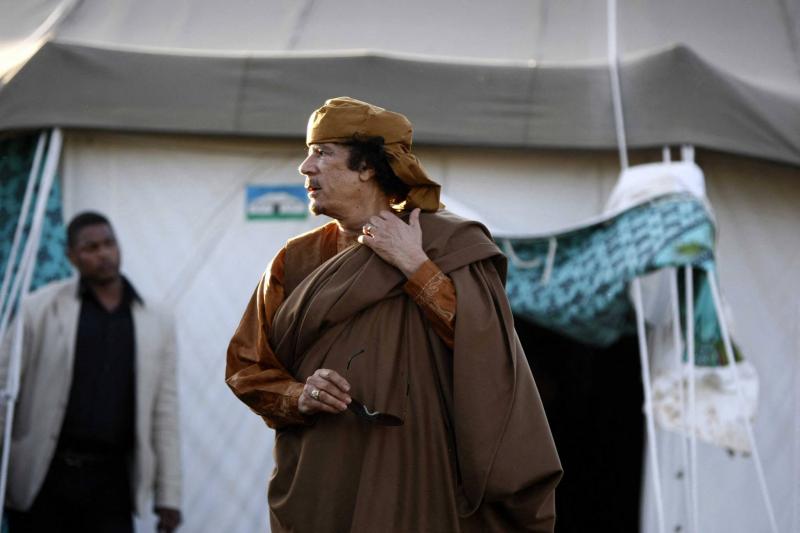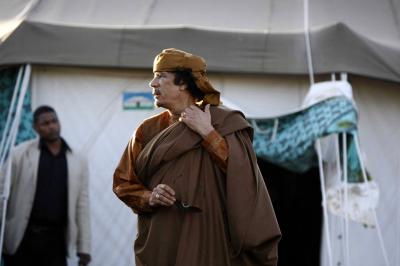Bloodied and staggering, he is assaulted by hands and dragged by his hair just minutes after being found in a hiding place inside a cement pipe in the city of Sirte, while the surrounding crowds scream in hysteria: "We've captured Gaddafi, we’ve caught the tyrant oppressor."
The final scene in Gaddafi's life, who ruled for over four decades, was tragic, ending with his corpse displayed in a refrigerated room at a vegetable store in Misrata (western Libya) on October 20, 2011, before being buried in a "secret" grave deep in the desert. Each year, as the anniversary of Gaddafi's death approaches, his supporters raise questions about the "hidden secret" behind keeping his grave unknown. This demand has led to the recent announcement by Saif al-Islam, Gaddafi's son, that his team is withdrawing from the preparations for the "Comprehensive National Conference for National Reconciliation" scheduled to be held in Sirte on April 28.
Sheikh Ali Abu Sbeihah, head of the team and chairman of the "Supreme Council of the Cities of Fezzan," stated, "We previously demanded that the Presidential Council demonstrate good faith to complete the reconciliation process by taking several steps, including revealing the grave of Gaddafi and his companions, but there was no response."
Abu Sbeihah mentioned that Libyan authorities "have not made efforts" to alleviate international pressures on the Gaddafi family, which is displaced outside the country, while other supporters of the former regime questioned "the reasoning behind keeping Gaddafi's grave secret in the desert of Misrata, unless it is aimed at revenge and vindictiveness against his family and loved ones."
Gaddafi and his son Mutassim were killed in Sirte after being captured by the "Revolutionaries of Misrata," who transported their bodies to their city before burying them in an unknown location. Since then, supporters of the former regime have been demanding the unearthing of the graves of Gaddafi, his son, and his defense minister Abu Bakr Younis, filing lawsuits to this end, but with no results.
Local media reported that Mahmoud Abdel Hamid, Gaddafi's nephew, shared some details about the burial of the three bodies, stating, "After washing them and praying over them, they were taken by car at night into the depths of the Misrata desert for more than an hour and a half." He mentioned that the armed men accompanying the bodies prevented him from looking to the sides of the road so he would not identify the location.
Considering what happened with Gaddafi's body and those of his companions, Jamal Al-Falah, head of the "Libyan Political Development Organization," asserted that the burial process and the secrecy surrounding it were conducted in a manner "that has nothing to do with human decency or humanity, regardless of him being a leader or the head of state; it should have been done by their families and loved ones."
Al-Falah recalled aspects of what occurred after Gaddafi's death, stating, "Supporters of the political Islamic current, who were opposed to the late president, attributed the concealment of his grave to fear of it becoming a shrine or site of pilgrimage for his supporters," describing this reasoning as "a weak argument that is laughable and intended to mock the minds of the Libyan people."
Previously, Salah Badi, leader of the internationally sanctioned "Resilience Brigade" in Misrata, who is considered one of those involved in burying Gaddafi, his son, and the defense minister, stated that he is "ready to disclose the location where Gaddafi and his companions were buried, if an agreement is reached with the local dignitaries and Libyan cities." However, so far, the "hidden secret" in the desert of Misrata remains undisclosed despite the demands of supporters of the former regime.
Badi has spoken several times to Asharq Al-Awsat about the events of the night Gaddafi was killed, explaining that "he did not bury the three bodies alone; there was a group that participated in washing, shrouding, and praying over them, including Sheikh Khaled Tantoush." He added: "When we finished burying them, a delegation from Sirte came to request Gaddafi's body, and we told them we wanted the body of Omar Al-Muhayshi," who is considered an opponent of Gaddafi.
Libyan human rights lawyer Nasser Al-Hawari defended the Gaddafi family's right to know the location of his grave, believing that "the time for grudges and settling scores has passed... today is a day for reconciliation and consensus, and for building a nation based on the values of freedom, justice, and equality."
In response to whether there is another Arab leader whose grave is unknown, Al-Hawari remarked, "This only happened in Libya," which was echoed by other rights advocates who stated that modern history "has not recorded instances of secret burials of other leaders."
Dr. Mustafa Al-Fitouri, a Libyan writer and academic, characterized "the assassination of martyr Muammar Gaddafi as the greatest catastrophe that appears to have turned into a curse that haunts the country and its people." He noted in a previous discussion with Asharq Al-Awsat that "the greatest crime remains the lack of disclosure of his grave, as those who assassinated and buried him are aware of his popularity, which is why they hid his grave so it does not become a pilgrimage site for the majority of Libyans."




